-
 Bitcoin
Bitcoin $82,770.9885
-0.53% -
 Ethereum
Ethereum $1,811.0838
-0.62% -
 Tether USDt
Tether USDt $0.9996
-0.01% -
 XRP
XRP $2.0610
1.56% -
 BNB
BNB $591.5998
-0.12% -
 USDC
USDC $0.9999
0.00% -
 Solana
Solana $116.7637
-3.59% -
 Dogecoin
Dogecoin $0.1606
-2.58% -
 Cardano
Cardano $0.6491
0.00% -
 TRON
TRON $0.2375
1.32% -
 Toncoin
Toncoin $3.6204
-7.56% -
 UNUS SED LEO
UNUS SED LEO $9.4063
0.23% -
 Chainlink
Chainlink $12.8000
-2.19% -
 Stellar
Stellar $0.2605
1.01% -
 Avalanche
Avalanche $18.1124
-1.26% -
 Sui
Sui $2.2384
-2.51% -
 Shiba Inu
Shiba Inu $0.0...01223
0.65% -
 Hedera
Hedera $0.1627
0.30% -
 Polkadot
Polkadot $4.0538
1.44% -
 Litecoin
Litecoin $82.9722
0.02% -
 MANTRA
MANTRA $6.4051
3.36% -
 Bitcoin Cash
Bitcoin Cash $301.6530
1.88% -
 Bitget Token
Bitget Token $4.4826
-1.05% -
 Dai
Dai $1.0000
0.02% -
 Ethena USDe
Ethena USDe $0.9995
-0.02% -
 Monero
Monero $212.5474
-1.93% -
 Hyperliquid
Hyperliquid $11.6624
-5.49% -
 Pi
Pi $0.5680
-13.45% -
 Uniswap
Uniswap $5.8333
-1.59% -
 Aptos
Aptos $5.0533
-1.32%
What does "trustlessness" of blockchain mean?
Blockchain's trustlessness shifts reliance from intermediaries to cryptographic security and consensus, enabling secure, peer-to-peer transactions without central authority.
Mar 28, 2025 at 06:00 pm
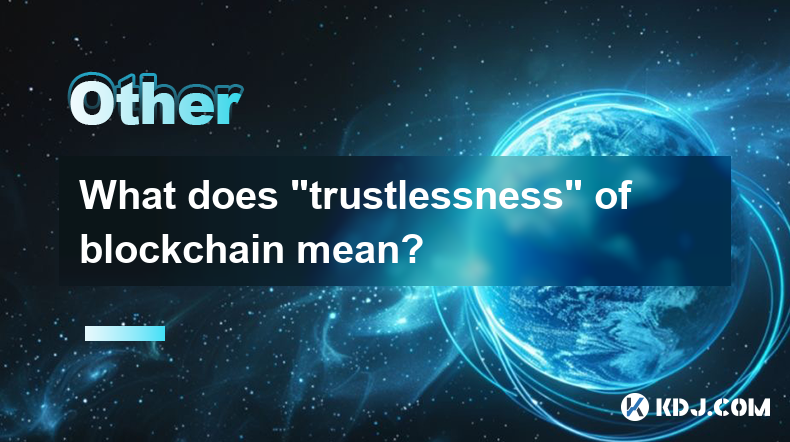
Understanding Trustlessness in Blockchain Technology
The term "trustlessness" in the context of blockchain refers to a system's ability to operate reliably without requiring participants to trust each other or a central authority. This is a core principle underpinning many cryptocurrencies and blockchain applications. Unlike traditional systems that rely on intermediaries like banks or governments to verify transactions and maintain records, blockchain achieves this through cryptographic techniques and distributed consensus mechanisms. This eliminates single points of failure and reduces the risk of manipulation or censorship.
How Trustlessness Works in Practice
Trustlessness isn't about eliminating trust entirely. Instead, it shifts trust from individuals or institutions to the mathematically verifiable properties of the blockchain itself. The cryptographic algorithms and consensus mechanisms ensure that transactions are processed correctly and securely, regardless of the trustworthiness of individual participants. This is achieved through several key components:
- Cryptography: Cryptographic hash functions and digital signatures ensure the integrity and authenticity of data on the blockchain. Any alteration to a block will be immediately detectable.
- Decentralization: The distributed nature of the blockchain means that data is replicated across numerous nodes. This makes it extremely difficult for any single entity to manipulate the system.
- Consensus Mechanisms: Algorithms like Proof-of-Work (PoW) or Proof-of-Stake (PoS) ensure that all participants agree on the valid state of the blockchain. This prevents fraudulent transactions from being added.
The Role of Consensus Mechanisms in Trustlessness
Consensus mechanisms are crucial for maintaining trustlessness. They dictate how new blocks of transactions are added to the blockchain. For example, in Proof-of-Work, miners compete to solve complex cryptographic puzzles. The first miner to solve the puzzle gets to add the next block, and the network verifies their work. This incentivizes honest behavior, as malicious actors would need immense computational power to overcome the honest majority. Proof-of-Stake, on the other hand, relies on validators who stake their own cryptocurrency to participate in the consensus process. The more cryptocurrency staked, the greater the validator's influence. This mechanism also incentivizes honest behavior, as validators risk losing their stake if they act maliciously.
Limitations of Trustlessness
While trustlessness is a highly desirable characteristic, it's not without limitations. The level of trustlessness varies depending on the specific implementation of the blockchain. Some potential issues include:
- 51% Attacks: In some consensus mechanisms, a sufficiently large group of malicious actors (more than 50% of the network's computing power or staked coins) could potentially control the blockchain and manipulate transactions. However, the threshold for such attacks is generally very high, making them difficult and costly to execute.
- Oracle Problems: Blockchains often need to interact with the outside world (e.g., to obtain real-world data for smart contracts). This interaction introduces a degree of trust in the oracles providing that data. The reliability of the oracle becomes a crucial factor in the overall trustlessness of the system.
- Smart Contract Vulnerabilities: Smart contracts, self-executing contracts with the terms of the agreement directly written into code, can contain vulnerabilities that malicious actors could exploit. These vulnerabilities can compromise the trustlessness of the system if not carefully addressed during development and auditing.
The Importance of Trustlessness in Cryptocurrencies
Trustlessness is a key feature that distinguishes cryptocurrencies from traditional financial systems. It allows for peer-to-peer transactions without the need for intermediaries, potentially reducing transaction fees and increasing efficiency. Furthermore, it enhances transparency and security by making the entire transaction history publicly auditable. This increased transparency and security helps to build confidence and trust in the system.
Trustlessness and Decentralized Applications (dApps)
The trustless nature of blockchain technology is also a cornerstone for the development of decentralized applications (dApps). dApps are applications that run on a decentralized network, rather than on a single server controlled by a central entity. This decentralization, enabled by trustless blockchain technology, offers several advantages, including:
- Censorship Resistance: dApps cannot be easily censored or shut down by a single entity.
- Increased Security: The decentralized nature of dApps makes them more resistant to attacks and data breaches.
- Transparency: All transactions and data on a dApp are typically publicly auditable.
The Future of Trustlessness
As blockchain technology continues to evolve, so too will the concept of trustlessness. Researchers are constantly exploring new consensus mechanisms and cryptographic techniques to enhance the security and efficiency of blockchain networks. The pursuit of greater trustlessness remains a driving force in the development of innovative blockchain solutions and applications. This ongoing development ensures that the core principles of blockchain, especially trustlessness, remain central to its future.
Common Questions and Answers
Q: Is a completely trustless system possible?
A: While striving for complete trustlessness is a goal, achieving it perfectly is likely impossible. External factors, such as oracle reliance and potential vulnerabilities in smart contracts, introduce some degree of trust. However, blockchain technology significantly reduces the need for trust compared to traditional systems.
Q: How does trustlessness differ from decentralization?
A: Decentralization refers to the distribution of data and control across multiple nodes. Trustlessness, on the other hand, focuses on the system's ability to operate reliably without requiring trust in individual participants or central authorities. While related, they are distinct concepts. A system can be decentralized but not trustless (e.g., if a single entity controls a majority of the nodes).
Q: What are the implications of a lack of trustlessness?
A: A lack of trustlessness can lead to vulnerabilities such as single points of failure, manipulation of transactions, censorship, and reduced security. This undermines the core benefits of blockchain technology.
Q: Can trustlessness be compromised?
A: Yes, trustlessness can be compromised, although it typically requires significant resources or exploiting vulnerabilities in the system's design or implementation. 51% attacks, smart contract vulnerabilities, and reliance on unreliable oracles are potential avenues for compromising trustlessness.
Q: How is trustlessness maintained in a public blockchain?
A: In a public blockchain, trustlessness is maintained through cryptographic security, distributed consensus mechanisms (like PoW or PoS), and the decentralized nature of the network. The collective participation of many independent nodes makes it computationally infeasible for any single entity to manipulate the system.
Disclaimer:info@kdj.com
The information provided is not trading advice. kdj.com does not assume any responsibility for any investments made based on the information provided in this article. Cryptocurrencies are highly volatile and it is highly recommended that you invest with caution after thorough research!
If you believe that the content used on this website infringes your copyright, please contact us immediately (info@kdj.com) and we will delete it promptly.
- Gold Exempt From New "Reciprocal" Tariffs
- 2025-04-04 06:35:12
- Time to Buy Aptos (APT) Cheap? This Chart Pattern Signals a 10% Move for the Price!
- 2025-04-04 06:35:12
- An Analyst Has Explained How Dogecoin Could Be at a Make-or-Break Level Right Now Based on a TA Chart Pattern
- 2025-04-04 06:30:12
- Micro Intelligence Company Strategy Has Purchased 22,048 Bitcoins Worth $1.92 Billion in a New Deal
- 2025-04-04 06:30:12
- BlockDAG's Beta Testnet Is Live— Aims to Achieve 15K TPS! Ethereum Price Falls 0.5% & ETC Dips 6.7%
- 2025-04-04 06:25:12
- title: New decentralized finance (DeFi) trading altcoin is surging after gaining support from the top US-based crypto exchange platform by volume
- 2025-04-04 06:25:12
Related knowledge

What are the future development trends of blockchain game development?
Apr 03,2025 at 05:00am
Blockchain technology has revolutionized various industries, and gaming is no exception. As we look to the future, several trends are set to shape the development of blockchain games. These trends not only promise to enhance the gaming experience but also to integrate blockchain technology more seamlessly into the gaming ecosystem. Let's explore these t...

What are the maintenance costs of blockchain system development?
Apr 03,2025 at 06:07pm
The maintenance costs of blockchain system development are multifaceted and depend on various factors. These costs can include technical maintenance, security updates, infrastructure expenses, and personnel costs. Understanding these elements is crucial for anyone planning to develop or maintain a blockchain system. Technical MaintenanceTechnical mainte...
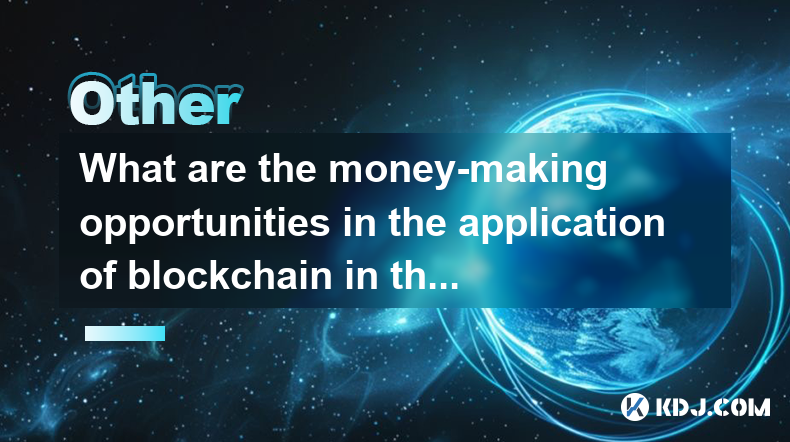
What are the money-making opportunities in the application of blockchain in the medical industry?
Apr 03,2025 at 03:35am
The integration of blockchain technology into the medical industry presents a myriad of money-making opportunities that can revolutionize healthcare systems. Blockchain's inherent characteristics, such as transparency, security, and immutability, make it an ideal solution for various medical applications. By leveraging blockchain, companies can develop ...
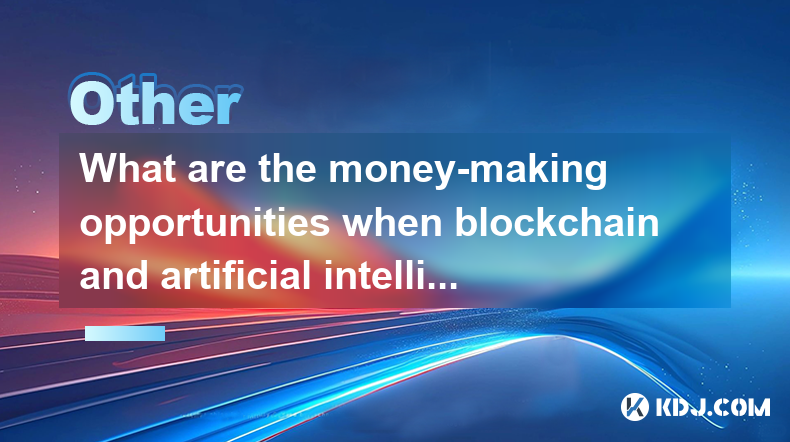
What are the money-making opportunities when blockchain and artificial intelligence are combined?
Apr 04,2025 at 01:28am
The convergence of blockchain and artificial intelligence (AI) presents a myriad of money-making opportunities within the cryptocurrency circle. This fusion leverages the decentralized and secure nature of blockchain with the analytical prowess of AI, creating innovative solutions and platforms that can generate significant revenue. From enhancing tradi...
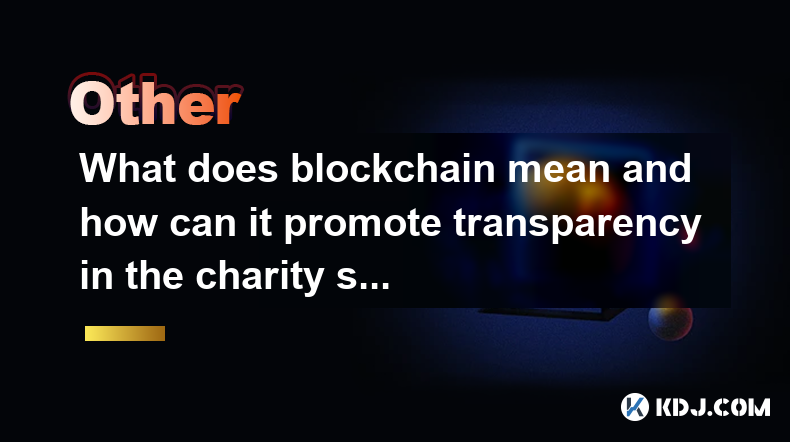
What does blockchain mean and how can it promote transparency in the charity sector?
Apr 03,2025 at 08:29pm
Blockchain technology is a decentralized, distributed ledger that records transactions across numerous computers. This ensures that the data is transparent and nearly impossible to alter retroactively. Essentially, blockchain serves as a digital ledger of all cryptocurrency transactions, enabling secure and direct exchanges without the need for intermed...
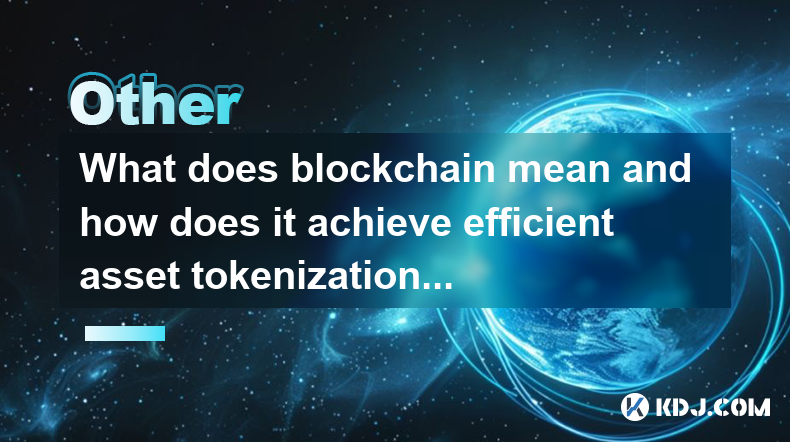
What does blockchain mean and how does it achieve efficient asset tokenization?
Apr 03,2025 at 07:57pm
Blockchain technology is a decentralized, distributed ledger that records transactions across numerous computers. It ensures that each transaction is secure, transparent, and immutable. The concept of blockchain was introduced with the launch of Bitcoin in 2009, but its applications have since expanded far beyond cryptocurrencies. At its core, blockchai...

What are the future development trends of blockchain game development?
Apr 03,2025 at 05:00am
Blockchain technology has revolutionized various industries, and gaming is no exception. As we look to the future, several trends are set to shape the development of blockchain games. These trends not only promise to enhance the gaming experience but also to integrate blockchain technology more seamlessly into the gaming ecosystem. Let's explore these t...

What are the maintenance costs of blockchain system development?
Apr 03,2025 at 06:07pm
The maintenance costs of blockchain system development are multifaceted and depend on various factors. These costs can include technical maintenance, security updates, infrastructure expenses, and personnel costs. Understanding these elements is crucial for anyone planning to develop or maintain a blockchain system. Technical MaintenanceTechnical mainte...

What are the money-making opportunities in the application of blockchain in the medical industry?
Apr 03,2025 at 03:35am
The integration of blockchain technology into the medical industry presents a myriad of money-making opportunities that can revolutionize healthcare systems. Blockchain's inherent characteristics, such as transparency, security, and immutability, make it an ideal solution for various medical applications. By leveraging blockchain, companies can develop ...

What are the money-making opportunities when blockchain and artificial intelligence are combined?
Apr 04,2025 at 01:28am
The convergence of blockchain and artificial intelligence (AI) presents a myriad of money-making opportunities within the cryptocurrency circle. This fusion leverages the decentralized and secure nature of blockchain with the analytical prowess of AI, creating innovative solutions and platforms that can generate significant revenue. From enhancing tradi...

What does blockchain mean and how can it promote transparency in the charity sector?
Apr 03,2025 at 08:29pm
Blockchain technology is a decentralized, distributed ledger that records transactions across numerous computers. This ensures that the data is transparent and nearly impossible to alter retroactively. Essentially, blockchain serves as a digital ledger of all cryptocurrency transactions, enabling secure and direct exchanges without the need for intermed...

What does blockchain mean and how does it achieve efficient asset tokenization?
Apr 03,2025 at 07:57pm
Blockchain technology is a decentralized, distributed ledger that records transactions across numerous computers. It ensures that each transaction is secure, transparent, and immutable. The concept of blockchain was introduced with the launch of Bitcoin in 2009, but its applications have since expanded far beyond cryptocurrencies. At its core, blockchai...
See all articles






















































































